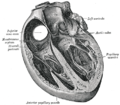Listening to some of the commemorations of 9/11, it struck me how often the human heart was referenced, in the context of healing. And I wondered: is this meant metaphorically or literally?
For example, Mark Oakley in St Paul’s preached a great sermon, which included this thought: ‘Whereas our bodies often do quite a lot to heal themselves, human hearts are not so skilful. They need to be loved back into life…’
And Prince Charles, in a very thoughtful speech, remarked: ‘But then I began to reflect that all the greatest wisdom that has come down to us over the ages speaks of the overriding need to break the law of cause and effect and somehow to find the strength to search for a more positive way of overcoming the evil in men’s hearts.’
Is there evil literally in men’s hearts? Can human hearts really be loved back to life? I suspect the phrases can be taken literally, that the heart is more than a mechanical organ capable of carry metaphorical associations.
There is, of course, Shakespeare’s line about hearts having reasons. Digging around on the internet, not always the best guide, it seems there is a growing acceptance of the notion of the ‘functional heart brain’, following the research of Andrew Armour. There’s a short summary paper from the Royal College of Psychiatrists here. For example, and if I’ve understood it right, after a heart transplant, the nerves of the heart do not reconnect for some time, and yet the new heart functions. In the paper, Mohamed Omar Salem discusses how hearts may communicate with the rest of the body and the brain via their exceptionally strong magnetic fields too, and further:
There is now evidence that a subtle yet influential electromagnetic or ‘energetic’ communication system operates just below our conscious awareness. Energetic interactions possibly contribute to the ‘magnetic’ attractions or repulsions that occur between individuals, and also affect social relationships. It was also found that one person’s brain waves can synchronize to another person’s heart.
(There’s further speculation about the heart’s involvement in precognition, though this is obviously controversial, and so I’ll avoid the distraction.)
It’s funny how we need MRI scanners and the like to help us believe things many intuitively know, and our ancestors presumably took to be blindingly obvious aspects of life. The heart has its reasons. Duh! Such are our times.
Then again, I know that in the heart unit up the road from here, people undergoing open heart surgery are told that it is a particularly emotive operation. You are warned about having a seemingly irrational moment of breakdown, after the wound itself is well on the mend, because your heart will have been exposed in more than one way.
Can hearts be helped literally by being loved? Can forces such as evil reside in men’s hearts? It seems so.
